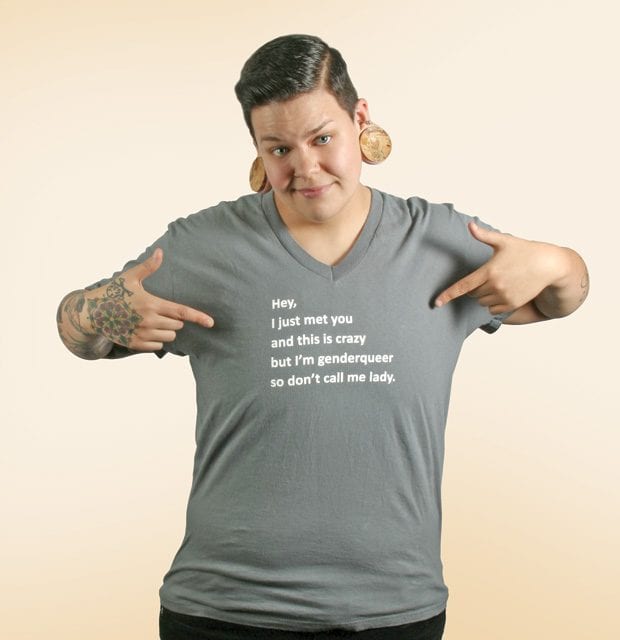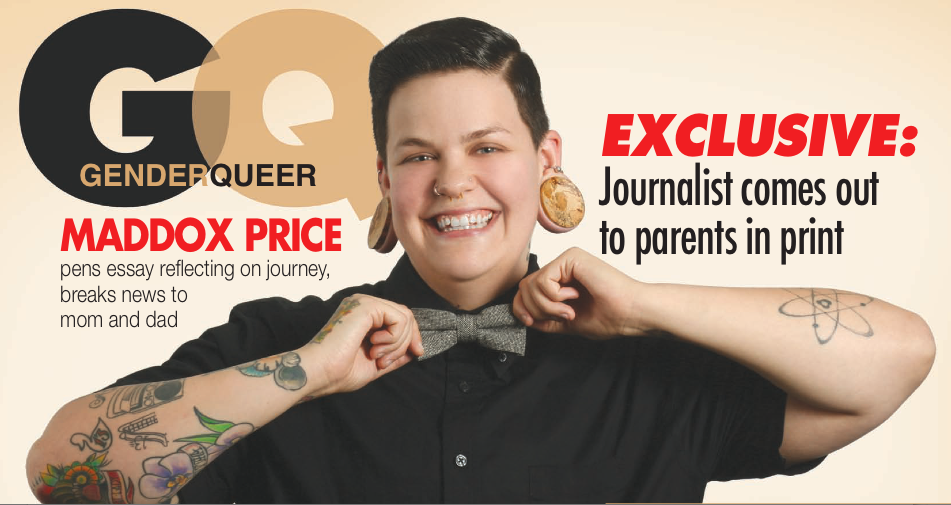Maddox Price reflects on his gender journey — and comes out to his parents
MADDOX PRICE | Contributing Writer
My gender identity began 40 years ago — 14 years before my birth, a premeditated existence etched out before conception.
My mother had planned for a girl since the day she married her high school sweetheart.
A brief history of the name Amy Joanna Price:
“I always wanted a girl, but God had other plans,” my mother said in her petite, nurturing tone. “My firstborn was a boy. But by my second time around I was certain this would be my baby girl. I could feel it.”
She’d picked out the name Amy Joanna – Joanna being in honor of Jesus’ loyal follower in the Bible and Amy because she just enjoyed the way the two syllables sounded.

BINARY BLUES | Maddox Price found some relief in coming out as a lesbian — even if it meant being kicked out of the house and living in a car for a month and a half. But he soon realized something was still missing. (Terry Thompson/Dallas Voice)
Her second child was a boy and so was her third. My mother thought she would never get to use the name.
A surprise pregnancy granted her one more try. She did not know she was carrying twins.
And when the doctor pulled me out by my tail end, he yelled, “It’s a girl!”
As the story goes, my dad, after recovering from a momentary loss of consciousness, spent the next hour calling family and telling everyone how they finally got their precious girl along with an unexpected boy.
My brother and I celebrated our 27th birthday this year. Two birthday cards were tilted at an acute angle against a vase of assorted daisies and leather leaves, atop my parents dining room table. One was addressed “Andrew,” the other “To my Amy girl.”
I had been going by “Maddox” for a month, and a mounting revelation was beginning to unravel at the seams — ripping apart a building pressure to conform to a 40-year-old gender predisposition.
I am genderqueer.
It’s a word still annoyingly underlined with that tiny red-squiggly-line-of-doom as unrecognized.
Genderqueer, a term with origins in the ’90s according to Nonbinary.org, is an umbrella term for people who don’t identify as gender-normative. This includes but isn’t limited to those who are gender-variant, agendered, transgender, gender nonconformist, bigendered, third-fourth and some-gendered.
In other words, it’s an identity that can fall somewhere between and sometimes nowhere on the gender spectrum. These terms, however, don’t correlate with my sex or my sexual orientation; for me, it’s merely an expression of my gender identity on a social scale rather than a biological one. While some genderqueer individuals might be addressed using neutral pronouns, such as “they,” “them,” “zie,” “hir” and so on, I lean toward the masculine (male-of-center) side. Not female, but not quite male either.
I can recall the moment I knew I was genderqueer, but not a defining moment I knew I wasn’t binary-compatible. I grew up painfully shy and under constant counseling since the age of 7 for my social anxiety disorder and selective mutism.
Coming from a middle-class home with a stay-at-home mom and an evangelical pastor father who was a pro-life lobbyist, anything queer-related was foreign for most of my childhood. But even at the age of 5, I knew I didn’t fit in. Maybe it was the lack of social skills or being uncomfortable in my own skin that caused the internal turmoil.
When puberty hit, I fell into a profound, often suicidal depression, not wanting my body to change and hating my breasts. While classmates’ closets were filled with flowery dresses, tiny bras and hoarded amounts of Lisa Frank nonsense, mine was laden with sports bras and boxers.
I kept my nose in my books. Those books and later the Internet helped me see beyond my circumstances and question everything.
I found solace coming out as a lesbian, although it cost me my home and forced me to live in my car for a month and a half. The lesbian community gave me something to be part of, and I flocked to it, clinging to its every move.
But even the lesbian community does not embrace gender expression so readily, and last year I started to feel discomfort again. It wasn’t about needing to fit into a demographic; it was about searching for what I’ve always really wanted.
I had an epiphany during a telephone conversation while driving in Dallas rush-hour traffic September 2012. I remember telling my friend: “I don’t understand why I can’t just be both genders. I definitely don’t feel like a woman but I don’t quite feel like a man either. This isn’t fair.”
She laughed and replied, “Well, that would be genderqueer.”
My world opened up, and I became comfortable with my newfound identity, even adopting the name Maddox, which I’d thought I’d been saving for my first child but now realized I’d actually been saving for myself.
I’ve worked for Albertson’s as an assistant bakery manager for nine years. I am a journalism major studying at Brookhaven Community College and editor-in-chief for The Brookhaven Courier. Both Albertson’s and the Dallas County Community College district prohibit discrimination based on gender identity and expression.
When I was approached by people at my newspaper job about my new name on Facebook, I simply said, “That’s my name now, and I’ll explain later.”
Explaining genderqueer to cisgender, heterosexual people isn’t easy. The language needed to be delicate. I told some of them “Amy” is a name that makes me uncomfortable and traps me into a pronoun with which I don’t necessarily identify.
On a good day I only get, “Ammm … er, I mean Maddox” five times a day in the newsroom. It’s an adjustment that my fellow newsies and I are getting used to.
Luckily, I had already been a longtime employee at these establishments. I can only imagine having to compete with “less complicated” individuals for a job.
As the Village Voice pointed out in an article published in June 2013 on genderqueer issues, when it comes to hiring in this market, anything that stands out as different is going to be a strike against somebody. I’m crossing my fingers for my future as well as for other gender non-conformists.
When I walk into establishments outside the gayborhood, people’s eyes draw lines that intersect directly on, above and behind me — and that’s when the whispers begin. There’s the simple, inconspicuous glare one might otherwise get from a 5-year-old; the direct approach, which involves invading my personal space and asking ignorantly demeaning questions; and my favorite, the passive-aggressive tactic, in which people cup their hands against their companions’ ears while covertly trying to focus one eye out the corner of their sockets, thinking I haven’t the faintest clue they are conversing about me.
Usually an abrupt turning of the head and an intrusive smile shakes them up a bit. It’s as if they have spotted a unicorn, and they’re trying to figure me out.
At first I thought it was all in my obsessive mind, but I am often reminded by my friends and girlfriend that people are staring at me.
I can’t help but imagine that the glares are directed toward my flattened chest, my 1950s-style clean-cut fade and my masculine attire. As dapper as I appear, I am not a passable male, so my discomfort continues.
Being regarded in conversations as “ma’am,” “lady,” “one of the girls,” “you ladies over here” and once even by a professor as “Ms. Maddox,” is like nails on a chalkboard. In this gender-unfriendly world I might have to get used to this if I decide never to take testosterone, a treatment that, for now, I have ruled out. However, a double mastectomy, top surgery, is in the plan. There is a lot of pressure from everyone in society on what it is to be female and male, even within the LGBTQ community, which sometimes still tries to police who can identify as what.
Asking people to call me by my preferred — and I use the word preferred loosely, because for me as of now it is a preference — pronoun (he, his and him) has been next to impossible. My feminine features, angelic voice, unruly breast size and hips that do not lie are not conducive with male pronouns.
I don’t look at gender-fluid persons as being born into the wrong skin; it is purely an added expansion into our skins. The previous implies that we were born with a defect that needs to be fixed. I am not defective and neither are my genderqueer and trans sisters and brothers.
There is no specific genderqueer movement, but the queer movement, which is inclusive of all sexual orientations and gender expressions, is making a slow rise. The Q has been left out of LGBT for far too long. People like activist and world champion slam poet Andrea Gibson and even local radical punk singer Alli Lowe of The Atomic Tanlines are helping bring genderqueer to the forefront.
This is my story.
As for my beloved mother and father, who have been tolerant and endearing but not supportive of my sexual orientation, it’s also a coming out of epic proportions.
This article appeared in the Dallas Voice print edition August 2, 2013.

















